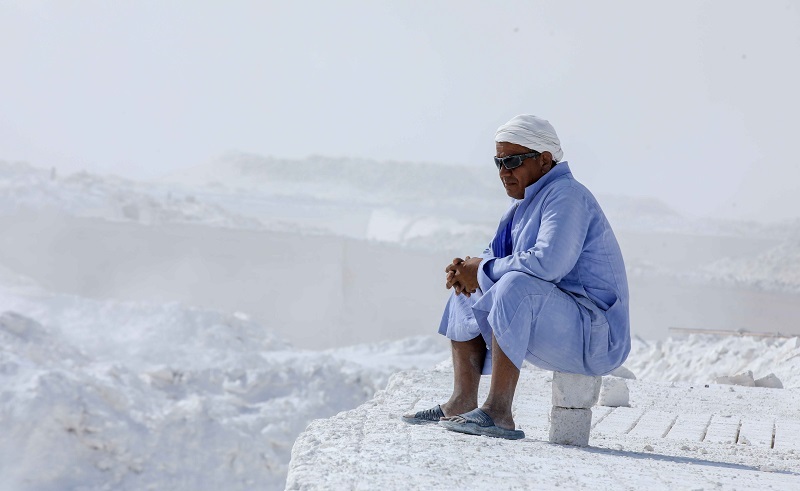Human Tales from Minya's Inhumane Limestone Quarries
[EXCLUSIVE] The ElFasla team heads to Minya to shed light on the harsh realities of life for Upper Egypt's quarry workers.

It's 5:30 AM. He's half-asleep on board a bus on the city's outskirts. In about half an hour, his daily shift as a worker at one of Minya's oldest limestone quarries begins. He didn't choose to spend his life slowly wasting away at this remote, highly-hazardous work environment. But as we found out in our talk with Minya's quarry workers, choice is a luxury that's has been stripped away from them the day they were taken to the quarries as children; leaving behind their education, childhood, and any prospect of a better future.
"We work in inhuman conditions. The limestone powder surrounding us poses countless health risks. We can't even see each other while working," exclaims 32-year-old Yehya* - who's been a quarry worker for as long as he can remember. "All the machinery we use is extremely dangerous. If they even touch a person, they could severely injure or kill them. All the wires, as you can see, are exposed; posing massive electrocution risks. What can we do? It's not like we can get any other job."
Limestone is a valuable product; one which is used in countless other products and industries. It's used in fertilizers, ceramics, animal feed, and even dairy products - owing to its highly-concentrated calcium content. Minya's quarries are one of the oldest and biggest in the country, and their revenue mostly comes from exporting to other governorates and even abroad. Despite the crucial importance of the industry, workers there rarely top the list of priorities. There's no social or health insurance, no benefits, and the nearest ambulance is usually in the city centre, many kilometres away. If one gets in a tragic work accident where one's's severely injured for life, he's given EGP 10,000 as compensation. In case a worker dies, the figure goes up to EGP 25,000. As is customary in Egypt, child labour is widespread at the quarries. At 14 or 15, workers start bringing in their kids so they could pass on their knowledge to them. At first, minors are assigned relatively safer tasks; like bagging the white powder or moving stones. As they grow older, they're 'promoted' to start working with machinery. Weekly salaries for minors start at as low as EGP 20; there are no missing zeros. Within a year or two, depending on their input, they can gain up to EGP 120 per week. Soaring poverty rates in Minya - one of the highest in the country - forces parents to send their kids off to the mountains so they could help out with the family's budget, or at the very least, be able to sustain themselves. No education. No toys. The most valuable items they would have are the dark sunglasses and the piece of clothes which they hope would lessen the risk of inhaling the powder for many hours on daily basis.
As is customary in Egypt, child labour is widespread at the quarries. At 14 or 15, workers start bringing in their kids so they could pass on their knowledge to them. At first, minors are assigned relatively safer tasks; like bagging the white powder or moving stones. As they grow older, they're 'promoted' to start working with machinery. Weekly salaries for minors start at as low as EGP 20; there are no missing zeros. Within a year or two, depending on their input, they can gain up to EGP 120 per week. Soaring poverty rates in Minya - one of the highest in the country - forces parents to send their kids off to the mountains so they could help out with the family's budget, or at the very least, be able to sustain themselves. No education. No toys. The most valuable items they would have are the dark sunglasses and the piece of clothes which they hope would lessen the risk of inhaling the powder for many hours on daily basis.
"I've never been to school. Why would I when I could make EGP 70 a week working here? But every week, I play football at church with my friends," says 14-year-old Mina.
In 2009, the then-Governor of Minya - Ahmed Gamal El-Din - enforced a tax on the quarries owners and workers. The decision entails paying anything from EGP 10,000 to EGP 25,000 in insurance for every worker, while the owners are forced to pay EGP 200,000 in revenue tax on an annual basis. The abrupt decision sent shockwaves through the mountains, and the workers spontaneously formed a protest and marched towards the governorate building in central Minya. After security forces dispersed the protestors - and even arrested a bunch of them - negotiations between the government and the quarry workers began. They reached an agreement to establish an EGP 5 million fund to the compensate the workers for injury or death. However, to get compensated or properly hospitalised, the injury must have occurred at the workplace. If a worker gets sick or misses a day's work for injuries that didn't occur at the quarry, they're left with neither treatment nor a salary.
After security forces dispersed the protestors - and even arrested a bunch of them - negotiations between the government and the quarry workers began. They reached an agreement to establish an EGP 5 million fund to the compensate the workers for injury or death. However, to get compensated or properly hospitalised, the injury must have occurred at the workplace. If a worker gets sick or misses a day's work for injuries that didn't occur at the quarry, they're left with neither treatment nor a salary.
"God will take care of us after all. I have a home and a wife, how can I give in to fear? I wish I could find another job, I would leave the country if I could. But I can't even begin to think of what else I can do. Living in the mountain has buried us alive, and our minds don't even function properly anymore," says a bitter 29-year-old Makram.
It's now 9 AM; the time for the breakfast break at the quarry. Traditional breakfast dishes are not what they're after, but more like lunch meals; rice, beans, and vegetables. They need food that would keep them energised and focused until it's time to leave at 1PM. It was then that I asked them what the best thing about their job was - to which the answer was 'going home to your kids in one piece.' Before publishing this story, a number of the quarry workers got in a car accident that killed and injured 40 of them on the way to the quarry. We weren't able to verify if they're the same ones we've interviewed. In all cases, our thoughts and prayers go out to them and their loved ones. May their tired souls rest in peace.
Before publishing this story, a number of the quarry workers got in a car accident that killed and injured 40 of them on the way to the quarry. We weren't able to verify if they're the same ones we've interviewed. In all cases, our thoughts and prayers go out to them and their loved ones. May their tired souls rest in peace.
Originally Published on ElFasla
Written by Ahmed Shiha
Translated by Moustafa Daly
Shoot by MO4Network's #MO4Prodcutions
- Previous Article Orange is the New Black Season 6: This is America
- Next Article Egyptian Candlemaker Brings Relaxation and Aromatherapy to Your Home
























